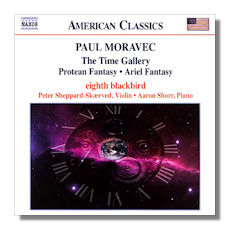
The Internet's Premier Classical Music Source
Related Links
- Latest Reviews
- More Reviews
-
By Composer
-
Collections
DVD & Blu-ray
Books
Concert Reviews
Articles/Interviews
Software
Audio
Search Amazon
Recommended Links
Site News
 CD Review
CD Review
Paul Moravec

Chamber Music
- The Time Gallery (2000)
- Protean Fantasy (1993)
- Ariel Fantasy (2002)
Peter Sheppard Skærved, violin
Aaron Shorr, piano
Eighth Blackbird
Naxos 8.559267 56:06
Summary for the Busy Executive: A lot of notes moving very fast.
Paul Moravec, an up-and-comer on the fast track, won the 2004 Pulitzer for music. These three chamber works give you some idea why.
Moravec writes in a neo-Romantic idiom, but without nineteenth-century pastiche. Like Barber, he allows modern dissonance, but the phrasing and melodic shapes wouldn't have shocked Brahms. He puts together his music very well – one remarks on a high degree of finish – and he aims high. However, one must look beyond craft to explain the power of these works. Moravec wants to move you and relies heavily on nineteenth-century rhetoric to do so.
I just wish I liked these pieces more. While I can acknowledge their craft, their skill, and their expressive component, nothing really grabs me. Moravec doesn't surprise me or convince me that others couldn't produce roughly the same result. Barber, for example, gives me genius themes and brilliant, quirky counterpoint. On the other hand, there's nothing here other than a generic vibe and too many empty listening calories. Moravec and I operate on two different wave-lengths. For me, Daniel Kellogg, with much the same idiom, does more. But none of us can like everything. Your mileage, as they say, will probably vary.
Nevertheless, my reservations definitely do not extend to the performers. If not already, Eighth Blackbird deserves to be treated like a rock star. I rarely encounter contemporary specialists who play with such passion, understanding, and knock-out musicianship. The Time Gallery challenges any group to simply get through it. Eighth Blackbird gives a reading of nuance and detail, one that normally requires years of acquaintance with a complex work. Sheppard-Skærved and Shorr, not quite at that level, nevertheless tear through the fantasies in an irresistible sweep. Their problem lies with the works themselves, too similar to avoid one blurring into the next. The fantasies (Moravec won the Pulitzer for the Tempest Fantasy, a later version of the Ariel) come across as the same kind of piece, which reinforces the image of the composer as a narrow talent.
But don't take my word for it. Listen for yourself. You may well arrive at a different conclusion. Naxos makes the price for experimenting a little easier to bear.
Copyright © 2008, Steve Schwartz




















